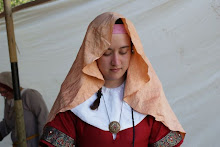Today I bring you some 10th-11th century Anglo-Saxon anti-elf recipes. In their culture, many diseases were attributed to elves, and this was, for the most part, accepted and supported by the church at the time. An interesting point is that when you have a sharp pain in your back the German word still used for it is "elf-shot". Another thing I personally find interesting is the inclusion of garlic in a preparation against "nightgoers"... looks like Bram Stoker didn't invent that much on his own:-) If any of you have more information on this, I'm all ears!
"Work a salve against elfkind and nightgoers [aelfcynne, nihtgengan], and the people with whom the Devil has intercourse. Take eowoumelan, wormwood, bishopwort, lupin, ashthroat, henbane, harewort, haransprecel, heathberry plants, cropleek, garlic, hedgerife grains, githrife, fennel. Put these herbs into one cup, set under the altar, sing over them nine masses; boil in butter and sheep's grease, add much holy salt, strain through a cloth; throw the herbs in running water. If any evil temptation, or an elf or nightgoers, happen to a man, smear his forehead with this salve, and put on his eyes, and where his body is sore, and cense him [with incense], and sign [the cross] often. His condition will soon be better"
Leechbook, book III
And one against nightmares:
"if a mare ride a man. Take lupin, and garlic, and betony, and frankincense. Bind them on a fawn's skin. Let a man have the herbs on him, and let him go inside.
Leechbook, book I
And one against Water Elves:
If a man is in the water elf disease [waeter aelfadle], then the nails of his hand are dark and the eyes teary, and he will look down. Give him this as a medicine [laecedome]: everthroat, hassok, the lower part of fane, yewberry, lupin, helenium, marshmallow head, fen mint, dill, lily, attorlathe, pulegium, marrubium, doch, elder, fel terre, wormwood, strawberry leaves, consolde. Soak with ale; add holy water to it. Sing this gealdor over it thrice:
I have bound on the wounds the best of war bandages, so the wounds neither burn nor burst, nor go further, nor spread, nor jump, nor the wounds increase [waco sian?], nor sores deepen. But may he himself keep in a healthy way [halewaege?] . May it not ache you more than it aches earth in ear [eare?]. Sing this many times, "May earth bear on you with all her might and main". These galdor a man may sing over the wound."
Leechbook III
Source: Joly, Karen Louise. "Popular Religion in Late Saxon England: Elf Charms in Context". University of North Carolina Press, 1996. pp. 149, 159, 165
I really, really shouldn't have to say this, but please don't try these at home.
Saturday, January 10, 2009
Subscribe to:
Post Comments (Atom)

No comments:
Post a Comment